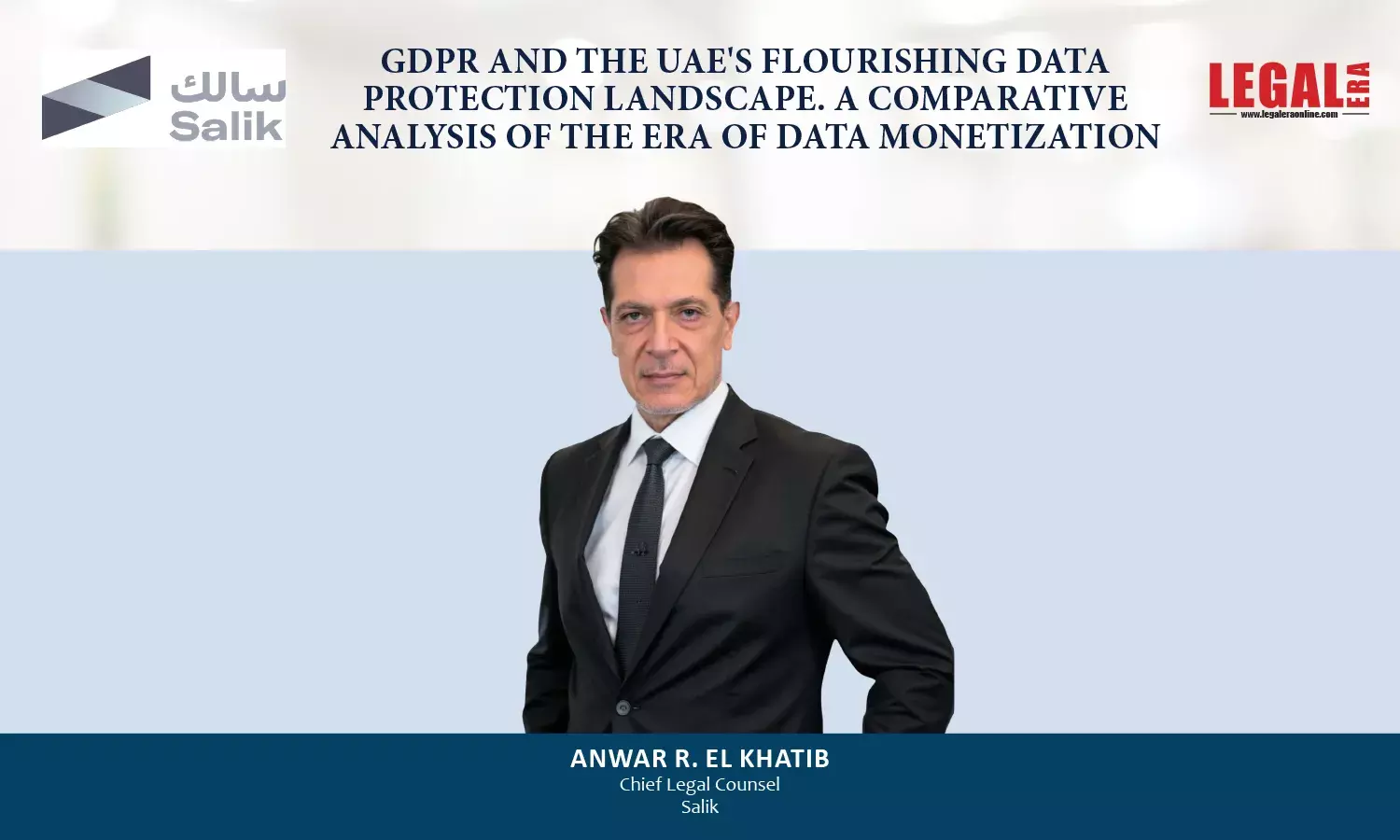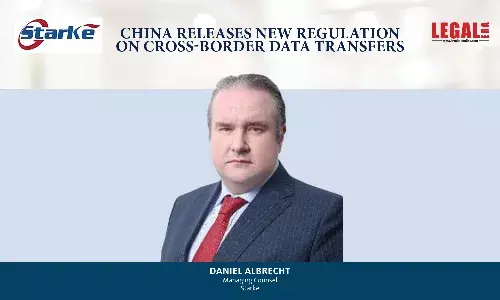GDPR And The UAE's Flourishing Data Protection Landscape. A Comparative Analysis Of The Era Of Data Monetization

GDPR And The UAE's Flourishing Data Protection Landscape. A Comparative Analysis Of The Era Of Data Monetization The UAE's commitment to data protection in the era of data monetization is evident in its evolving legal framework, which strikes a balance between fostering innovation and safeguarding privacy rights The digital revolution has steered in an era of unprecedented data generation...
GDPR And The UAE's Flourishing Data Protection Landscape. A Comparative Analysis Of The Era Of Data Monetization
The UAE's commitment to data protection in the era of data monetization is evident in its evolving legal framework, which strikes a balance between fostering innovation and safeguarding privacy rights
The digital revolution has steered in an era of unprecedented data generation and utilization. This data, when harnessed responsibly, can be a powerful engine for economic growth and social advancement. The concept of data monetization, where data is treated as a valuable asset to be leveraged for commercial gain, is gaining significant traction globally. The UAE, with its ambitious vision for a knowledge-based economy and its rapid adoption of cutting-edge technologies, is at the forefront of this data-driven transformation. However, the monetization of data must be balanced with the fundamental right to privacy. This article delves into the intricate interplay between data monetization and data protection in the UAE, examining how the nation’s evolving data protection framework aligns with the principles of the European Union’s General Data Protection Regulation (GDPR) and exploring the potential for greater international collaboration in shaping a cohesive global approach to data protection.
Data Monetization in the UAE: A Catalyst for Economic Growth and Innovation
The UAE is actively fostering a data-driven ecosystem across diverse sectors, recognizing the immense potential of data monetization to drive economic growth, spur innovation, and enhance public services. Here’s a glimpse into how data is being leveraged across key sectors:
- Finance: The UAE’s financial sector is embracing data monetization to offer personalized financial products, optimize risk assessment, and combat fraud. Open banking initiatives, fueled by secure data sharing, are empowering customers with greater control over their financial data and enabling the development of innovative fintech solutions. AI-powered financial analysis is providing deeper insights into market trends and investment opportunities.
- Healthcare: Data is revolutionizing healthcare in the UAE, enabling telemedicine services that bridge geographical barriers, facilitating predictive diagnostics for early disease detection, and accelerating drug discovery through advanced analytics and research. The UAE’s focus on precision medicine and personalized healthcare is heavily reliant on data-driven insights.
- Smart Cities: The UAE is a pioneer in smart city development, leveraging data from connected devices and sensors to optimize urban living. Real-time data analysis is used to manage traffic flow, reduce congestion, and enhance road safety. Smart grids powered by data analytics are optimizing energy consumption and promoting sustainable practices. Data-driven insights are also being used to enhance public safety, improve waste management, and optimize resource allocation.
- E-commerce: The UAE boasts a thriving e-commerce sector, with data playing a pivotal role in driving customer engagement and sales. Personalized product recommendations, targeted advertising campaigns, and dynamic pricing strategies are key data monetization tools used by e-commerce businesses in the UAE. Data analytics also helps optimize supply chains, improve logistics, and enhance customer service.
The UAE’s Robust and Multi-Layered Data Protection Framework
While the UAE's data protection framework has been shaped by its own unique context and priorities, it shares many similarities with the GDPR, reflecting a global convergence towards stronger data protection standards
Recognizing the importance of safeguarding individuals’ privacy rights in the digital age, the UAE has proactively established a comprehensive data protection framework that draws inspiration from international best practices while catering to the unique needs of its evolving digital economy. This framework comprises a multi-layered approach:
- Federal Data Protection Law: The cornerstone of the UAE’s data protection regime is Federal Decree-Law No. 45 of 2021 on Personal Data Protection. This landmark legislation provides a robust legal foundation for the protection of personal data across all emirates and sectors, setting out clear principles for data processing, data subject rights, and enforcement mechanisms.
- Federal Law No. 2 of 2019: The Healthcare Data Law introduces several key principles and requirements for the handling of health data in the UAE. These include:
- Consent: Healthcare providers must obtain explicit consent from patients before collecting, using, or disclosing their health data, except in specific circumstances defined by the law, such as medical emergencies or public health reporting.
- Data Security: Healthcare providers must implement appropriate technical and organizational security measures to protect health data from unauthorized access, use, disclosure, alteration, or destruction. This includes measures such as encryption, access controls, and regular security audits.
- Confidentiality: Healthcare providers have a duty to maintain the confidentiality of patient health data and are prohibited from disclosing it to third parties without the patient’s consent, except in limited circumstances authorized by law.
It is important to note that both the UAE Federal Data Protection Law and the Healthcare Data Law are still awaiting their respective implementation regulations. These regulations are expected to provide more detailed guidance on the practical application and enforcement of these laws, including specific procedures for obtaining consent, handling data breaches, and imposing penalties.
- DIFC Data Protection Law: The Dubai International Financial Centre (DIFC), a leading global financial hub, has its own comprehensive data protection law, DIFC Law No. 5 of 2020. This law closely aligns with the principles of the GDPR, reflecting the DIFC’s commitment to international standards and its role as a hub for international business.
- ADGM Data Protection Regulations: The Abu Dhabi Global Market (ADGM), another prominent international financial center, has also implemented its own data protection regulations, the ADGM Data Protection Regulations of 2021. These regulations provide a comprehensive framework for data protection within the ADGM, drawing heavily from the GDPR and reflecting the ADGM’s commitment to maintaining a robust and internationally recognized data protection regime.
A Comparative Analysis: GDPR and the UAE’s Data Protection Laws
While the UAE’s data protection framework has been shaped by its own unique context and priorities, it shares many similarities with the GDPR, reflecting a global convergence towards stronger data protection standards. However, some key differences remain:
- Similarities:
Data Subject Rights: Both the GDPR and the UAE’s data protection laws recognize a core set of data subject rights, empowering individuals with greater control over their personal data. These rights include the right to access, rectify, erase, and restrict the processing of their data.
Accountability: Both frameworks emphasize the principle of accountability, requiring organizations to implement appropriate technical and organizational measures to ensure the security and privacy of personal data. They also promote transparency and require organizations to be accountable for their data processing activities.
Data Security: Both the GDPR and the UAE laws mandate strong data security safeguards to protect personal data from unauthorized access, use, disclosure, alteration, or destruction. They require organizations to implement appropriate security measures to protect the confidentiality, integrity, and availability of personal data.
- Differences:
Enforcement: One notable difference lies in the approach to enforcement. The GDPR is known for its stringent enforcement mechanisms, including hefty fines for violations, reaching up to €20 million or 4% of annual global turnover, whichever is higher. The UAE laws, while providing for penalties, traditionally focus on fines based on the actual harm caused by data breaches or misuse. However, this approach may evolve as the UAE’s data protection regime matures and enforcement practices are further developed.
Territorial Scope: Another key difference lies in the territorial scope of the laws. The UAE’s data protection laws primarily apply to data processing activities that take place within their respective jurisdictions, while the GDPR has extraterritorial reach, applying to organizations that process the personal data of EU residents regardless of where the organization is located.
Specific Provisions: There are also variations in specific provisions, such as those related to data transfers, the appointment of data protection officers, and the requirements for data protection impact assessments. These differences reflect the unique context and priorities of each jurisdiction.
The UAE: A Regional Pioneer in Data Protection
The UAE’s proactive approach to data protection has positioned it as one of the regional leaders in safeguarding privacy rights in the digital age. Its comprehensive legal framework, coupled with its commitment to international cooperation and its active participation in global data protection initiatives, sets a positive example for other countries in the region and beyond.
Towards a Harmonized Future: Fostering Collaboration between GDPR and the UAE
Given the UAE’s robust data protection regime and its growing prominence in the global digital economy, there is a significant opportunity for greater collaboration between the EU’s GDPR regulators and the UAE’s data protection authorities. This collaboration could take various forms:
- Mutual Recognition of Frameworks: Exploring the possibility of mutual recognition of each other’s data protection frameworks could facilitate seamless cross-border data flows, promoting trade and investment while ensuring adequate data protection. This would require careful assessment and alignment of the respective frameworks to ensure consistency and compliance with both sets of regulations.
- Joint Enforcement Initiatives: Collaborating on investigations and enforcement actions could strengthen the global response to data protection violations with cross-border implications. This could involve sharing information, coordinating investigations, and providing mutual assistance in enforcement proceedings.
- Sharing Best Practices: Exchanging knowledge and expertise on data protection implementation and enforcement could promote consistent and effective data protection practices globally. This could involve organizing joint workshops, training programs, and conferences to share best practices and address emerging challenges in the field of data protection.
Conclusion
The UAE’s commitment to data protection in the era of data monetization is evident in its evolving legal framework, which strikes a balance between fostering innovation and safeguarding privacy rights. While differences remain between the UAE laws and the GDPR, there is significant potential for collaboration and convergence, leading to a more harmonized and effective global approach to data protection. By working together, the EU and the UAE can contribute to building a more trustworthy and accountable digital ecosystem, where data is harnessed responsibly for the benefit of individuals, businesses, and society as a whole.
Disclaimer – The views expressed in this article are the personal views of the author and are purely informative in nature.




